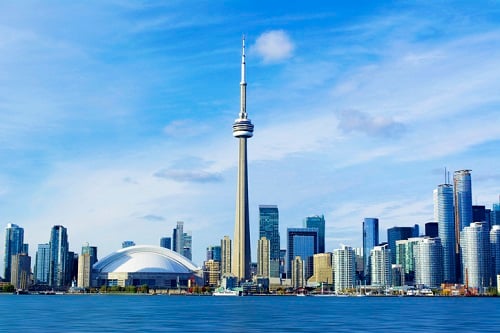The so-called "surveillance city" clears another obstacle and moves forward to transform Toronto's waterfront

Alphabet Inc.’s plan to create a “city of the future” on Toronto’s waterfront has cleared a major hurdle, though the project will be much smaller than once envisioned.
Sidewalk Labs LLC, Alphabet’s urban innovation unit and sister to Google, won unanimous approval to move forward with the project on Thursday after relenting on several controversial issues. Those included sticking to its original 12-acre plan rather than a 190-acre project it proposed in June. Waterfront Toronto, the public corporation in charge of the development, will take the lead on all data and privacy matters and Sidewalk has agreed to move forward without financing from the city for transit.
For Stephen Diamond, chairman of the Waterfront Board, these were the most important issues that needed to be resolved.
“There has been significant movement from Sidewalk Labs on those areas of concern as well as other issues,” Diamond said in a press conference in Toronto. “There is still further work to be done before a final decision is made.”
The deal strikes a promising chord for big tech’s role in city-building while highlighting the importance of compromising with public entities. That’s in stark contrast to Amazon.com Inc. which withdrew plans for a second headquarters in New York after a backlash from the neighbourhood as well as local and regional politicians.
“On our own terms”
Sidewalk had proposed investing $1.3 billion alongside local partners to kick off the development, meant to showcase Alphabet CEO Larry Page’s vision for a modern city powered by sensors and data. Ideas included everything from underground garbage disposal to heated bike lanes, along with offices and thousands of residential units, including below-market and affordable units.
“We want to engage big tech, but on our own terms,” said Alex Ryan, program director of the MaRS Solutions Lab, a tech hub in downtown Toronto that has been involved in consultations with Sidewalk and the waterfront agency. “Toronto has figured out the middle ground. Rather than be bullied or pushed over, and rather than run them out of town like with Amazon HQ2, Toronto is coming at this as equals.”
Further Concessions
Under the existing plan, Waterfront Toronto will receive fair market value for the land when it’s sold, with the current appraised value at about $590 million. The public agency will then make investments in affordable housing and sustainability for the region.
Additionally, Sidewalk Labs has agreed that personal info will be stored and processed in Canada and will work toward storing and processing non-personal data in the country. It is also pledging that Canadian companies will be able to use any patents that Sidewalk Labs generates from digital innovations on the project. The public will be entitled to a revenue stream on products and services piloted in Waterfront Toronto-facilitated test-beds, based on global net revenues.
Ontario Premier Doug Ford said in a statement that the deal protects the privacy rights of Ontarians and respects taxpayers while also showing an openness to business.
“The right balance has been struck between protecting the interests of the people of Ontario and encouraging investment, innovation and economic development.”
Toronto Mayor John Tory welcomed Waterfront Toronto’s decision to move forward due to Sidewalk listening to all concerns raised, and stressed the importance of moving through the process carefully.
Part of Sidewalk’s success was its pivot to engage more with local stakeholders compared with last year, when many Torontonians didn’t feel like they were being heard by the tech conglomerate, Ryan said.
“I do give them credit, I think it was hard for them to move but I think they recognized that they had to, if they wanted to move forward with the project,” Diamond said of Sidewalk Labs. “They have also made it abundantly clear that they need to make sure the economics of the project will work for them as well.”
The scaled-back plan does leave the door open for future expansion, although the economics are now unclear. The June iteration of the plan had included development of a second site called Villiers West into commercial real estate, including a new Google Canadian headquarters, to make the economics work for the below market housing and other plans for the Quayside site.
The development is far from a done deal. Waterfront’s board will begin public consultations to evaluate the rest of Sidewalk’s proposal and will decide on March 31, 2020 whether to pursue implementation agreements. The deadline for finalizing a deal is currently set for Dec 31, 2020.



